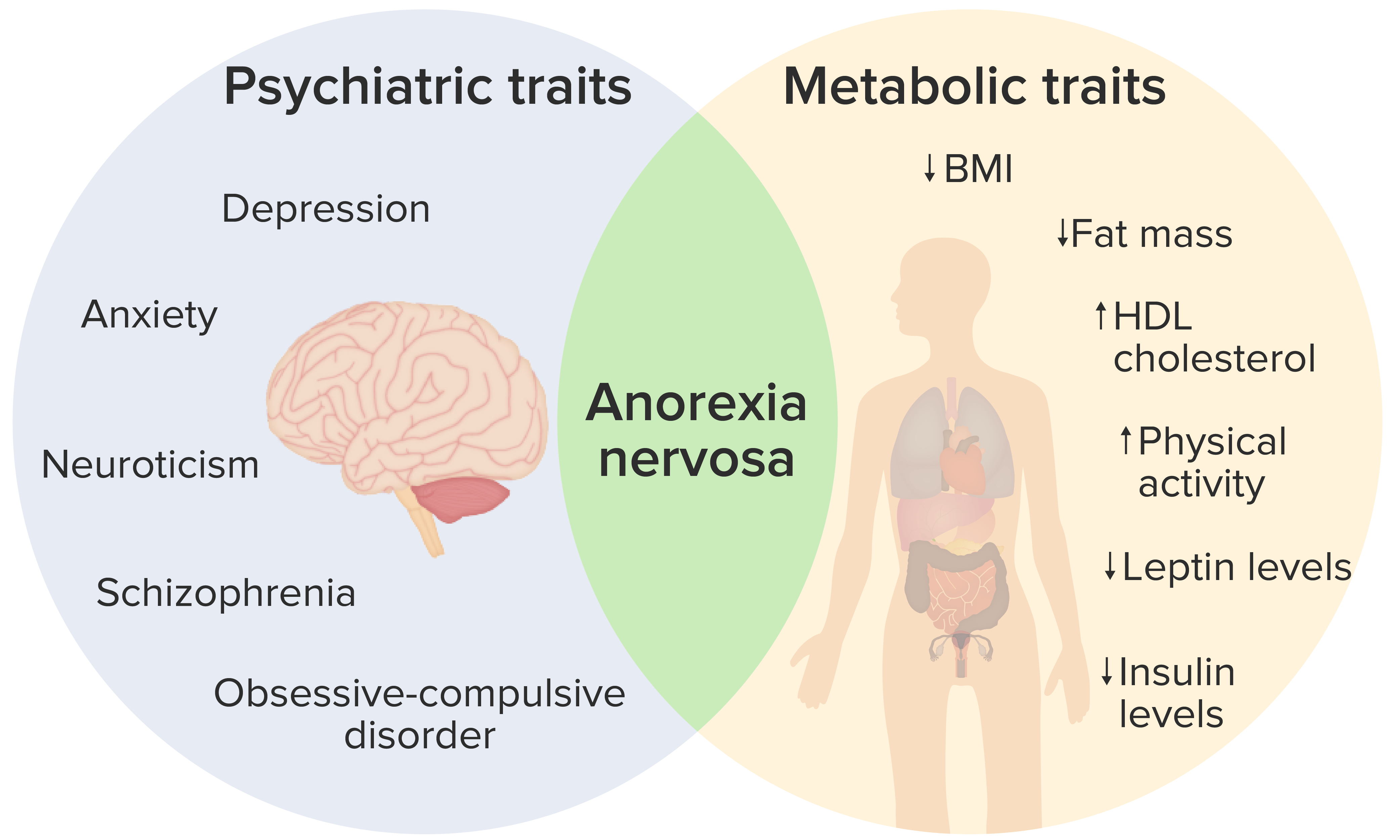
Anorexia nervosa is a complex eating disorder characterized by extreme weight loss, anxiety about weight and calorie counting, distorted body image, and, in some cases, an intense fear of becoming obese, even if the person is below normal weight. The most important feature of anorexia is a constant and obsessive desire to lose weight, even if the person is excessively thin. A person may restrict food intake, starve, abuse diet or exercise, or use laxatives, diuretics, or other medications to lose weight.
This disorder can be particularly dangerous, as patients with anorexia can experience a range of health problems, including osteoporosis, low blood pressure, heart problems, infertility and even death. Mental health disorders such as depression, anxiety and obsessive-compulsive disorder are also common.
Anorexia usually begins in adolescence or early adulthood, although it can occur at any age. However, it is much more common in women than in men.
Doctors use the patient's history, physical examination, laboratory tests, and psychiatric assessment tools to diagnose anorexia. Treatment usually includes nutritional counseling, psychotherapy, and sometimes medication.
Reasons
The causes of anorexia are complex and often involve many factors, including genetic, biological, psychological and social.
Genetic factors: Research suggests that genetics may play a role in the development of anorexia. For example, people who have a first-line relative (such as a sibling or parent) with an eating disorder are at increased risk of developing anorexia. Certain genes involved in appetite and behavioral control have also been linked to anorexia.
Biological factors: Hormonal changes, psychiatric disorders (such as depression, anxiety or obsessive-compulsive disorder), serotonin imbalance (a neurotransmitter that regulates mood, appetite and behavior) and dysbiosis (changes in the gut microbiota) can also contribute to the development of anorexia.
Psychological factors: Personality traits such as perfectionism, straightforward behavior, and very strict self-control may also be associated with the risk of anorexia. In addition, pre-existing mental health problems such as depression, anxiety or PTSD can also increase the risk of developing anorexia.
Social Factors: Our culture's and society's emphasis on thinness, beauty standards, and pressure to meet certain body image expectations can also contribute to the development of anorexia. In addition, experiences of harassment, discrimination, or violence may increase the risk of developing anorexia.
It is important to note that although these factors may increase the risk of developing anorexia, they are not the direct causes. Anorexia is often caused by the interaction of several factors, and each person is unique.

Physical symptoms of anorexia
Anorexia is an eating disorder characterized by an obsession with weight and food, resulting in extreme weight loss and self-starvation. Anorexia has serious consequences for the whole body, causing many physical symptoms and health problems.
Due to inadequate food intake, one of the first and most noticeable symptoms of anorexia is extreme weight loss. Patients may appear emaciated and have significant loss of body fat and muscle mass.
Women and girls who suffer from anorexia may experience changes in their menstrual cycles or the absence of them altogether, called amenorrhea. This is due to hormonal imbalance caused by extreme weight loss and inadequate food intake.
Anorexia can have profound effects on the cardiovascular system, causing bradycardia (slow heart rate), hypotension (low blood pressure) and, in severe cases, heart failure.
Anorexia can cause skin and hair changes. Patients suffer from extremely dry skin, bruising, hair thinning or even hair loss. Some individuals may also have fine, fluffy hair that may grow on the face, back, and chest as the body's attempt to keep warm.
Long-term nutrient deficiencies, especially calcium, can lead to osteopenia (decreased bone density) or osteoporosis (severely decreased bone density), which increases the risk of fractures.
Anorexia can cause a variety of hormonal disorders, such as low thyroid hormone production, low sex drive, and low growth hormone production, especially in childhood and adolescence.
Disorders of various organ systems can cause other symptoms such as fatigue, headache, chills, constipation, sleep disorders, etc.
Emotional and behavioral disorders of anorexia
Anorexia, like other eating disorders, is very complex and multifaceted, with many symptoms, both physical and emotional. Signs and symptoms can vary from person to person, but here are some common emotional and behavioral characteristics that individuals with anorexia may experience:
Individuals with anorexia are often obsessively concerned about their weight and body size. They may constantly check their weight, measure their body and compare themselves to others. This obsessive behavior can also include controlling food, calories, and health.
Anorexia is often associated with a distorted body image. Even if a person is too thin, they may see themselves as too fat or still be dissatisfied with their body. This distorted perception of the body is one of the main features of anorexia.
Individuals with anorexia may begin to avoid eating in public, avoid meals, divide food into small portions, or eat very slowly. There may also be noticeable changes in eating, such as avoiding certain food groups or an obsessive need to eat only certain foods.
Mood swings, depression, anxiety or apathy may often be seen. Other emotional symptoms may include social withdrawal, low self-worth, guilt about eating, and difficulty coping with stress.
Some individuals with anorexia may experience an obsessive desire to be active, even when they are extremely exhausted. This can include extreme exercise regimes or an obsessive need to constantly move.
It is important to note that these emotional and behavioral symptoms may vary between individuals and may change over time. Professional help is essential to the successful diagnosis and treatment of anorexia.

Possible complications
Anorexia is a very serious condition that can lead to many complications, including both physical and psychological consequences. Here are some important complications of anorexia:
Anorexia nervosa can cause dangerously large weight loss. In addition, long-term starvation can have serious consequences for the whole body, including the deterioration of the functions of all organs, and critical weight loss can lead to death.
Due to reduced weight and lack of food, a number of cardiovascular problems can occur, such as low blood pressure, bradycardia (decreased heart rate), arrhythmia (irregular heart rhythm) and heart failure. This can cause serious health problems, including heart attack or death.
Anorexia can lead to osteoporosis, or bone loss, because the body begins to use bone mass as an energy source. This can lead to fractures and other bone problems.
Anorexia can cause various hormonal changes. It can cause absence of menstruation in women, reduced sex drive and fertility in both men and women, as well as chronic fatigue and hypothermia.
Anorexia can cause mood disorders, such as depression and anxiety, and can increase the risk of suicide. In addition, nutritional deficiencies can affect brain function, leading to impaired concentration, memory problems, and potentially long-term brain changes.
Anorexia can also cause digestive problems, including constipation, bloating, inflammation of the gastrointestinal tract, and chronic pain.
These complications can be life-threatening, so it is important that individuals with anorexia get professional help as soon as possible.
When to see a doctor?
If you notice symptoms of anorexia, such as extreme weight loss, a constant obsession with weight and food, an uncontrollable fear of gaining weight, an unusually low calorie intake, or you develop menstrual irregularities, you should see a healthcare professional right away. Also, if you notice that your eating habits or the way you feel about your body is affecting your daily life, health or happiness, this is another important signal to see a doctor.
Can anorexia be prevented?
Anorexia is a complex disorder, the prevention of which involves many aspects. Although there is no specific way to 100% prevent anorexia, there are some strategies that can help reduce the risk and promote a healthy attitude towards food and body:
Promoting healthy eating: It is important to promote healthy eating behaviors that include a variety of foods and adequate nutrient diversity, rather than focusing on weight loss or unreasonable food avoidance
Promoting a healthy body image: It is important to recognize and emphasize that a healthy body comes in all shapes and sizes. This includes resisting the unattainable ideals of beauty promoted by social media.
Mental health care: Given that anorexia is associated with mental health problems such as depression and anxiety, it is important to ensure that individuals get the help they need if they are experiencing mental health problems.
Early intervention and education: It is important to promote the aforementioned principles of healthy eating and body image from an early age. Schools and families can play an important role in educating children and adolescents about eating disorders and their dangers, and showing them how to recognize their symptoms.
Fostering family and social support: It is important to maintain a strong family and social connection for a person to feel safe and loved. Families and friends can play an important role in supporting a person with an eating disorder.
Seeking professional help: If you suspect that a person may be suffering from anorexia, it is important to seek professional help as soon as possible. Early intervention can help prevent long-term health problems and increase the success of treatment.
:max_bytes(150000):strip_icc()/VWH_Illustration_Considerations-for-Eating-Disorder-Recovery_Tara-Anand_Final-4a3e3f419ac24a04a93c36f4178a0f5f.jpg)
Sources of information:
American Psychiatric Association. (2013). Diagnostic and statistical manual of mental disorders (5th ed.). https://doi.org/10.1176/appi.books.9780890425596
Arcelus, J., Mitchell, A. J., Wales, J., & Nielsen, S. (2011). Mortality rates in patients with anorexia nervosa and other eating disorders: a meta-analysis of 36 studies. Archives of general psychiatry, 68(7), 724-731. https://doi.org/10.1001/archgenpsychiatry.2011.74
Bulik, C. M., Sullivan, P. F., Tozzi, F., Furberg, H., Lichtenstein, P., & Pedersen, N. L. (2006). Prevalence, heritability, and prospective risk factors for anorexia nervosa. Archives of general psychiatry, 63(3), 305-312. https://doi.org/10.1001/archpsyc.63.3.305
Treasure, J., Claudino, A. M., & Zucker, N. (2010). Eating disorders. The Lancet, 375(9714), 583-593. https://doi.org/10.1016/S0140-6736(09)61748-7
Hay, P. J., Claudino, A., & Smith, C. (2019). Anorexia nervosa: diagnosis, risk factors, and evidence-based treatment. Journal of the American Academy of Physician Assistants, 32(5), 24-29. https://doi.org/10.1097/01.JAA.0000554350.47876.a7
Neumark-Sztainer, D., & Haines, J. (2004). Psychosocial and behavioral consequences of obesity. In Handbook of obesity prevention (pp. 349-372). Springer, Boston, MA. https://doi.org/10.1007/0-387-29915-8_18
Keski-Rahkonen, A., & Mustelin, L. (2016). Epidemiology of eating disorders in Europe: prevalence, incidence, comorbidity, course, consequences, and risk factors. Current opinion in psychiatry, 29(6), 340-345. https://doi.org/10.1097/YCO.0000000000000278
# anoreksija






